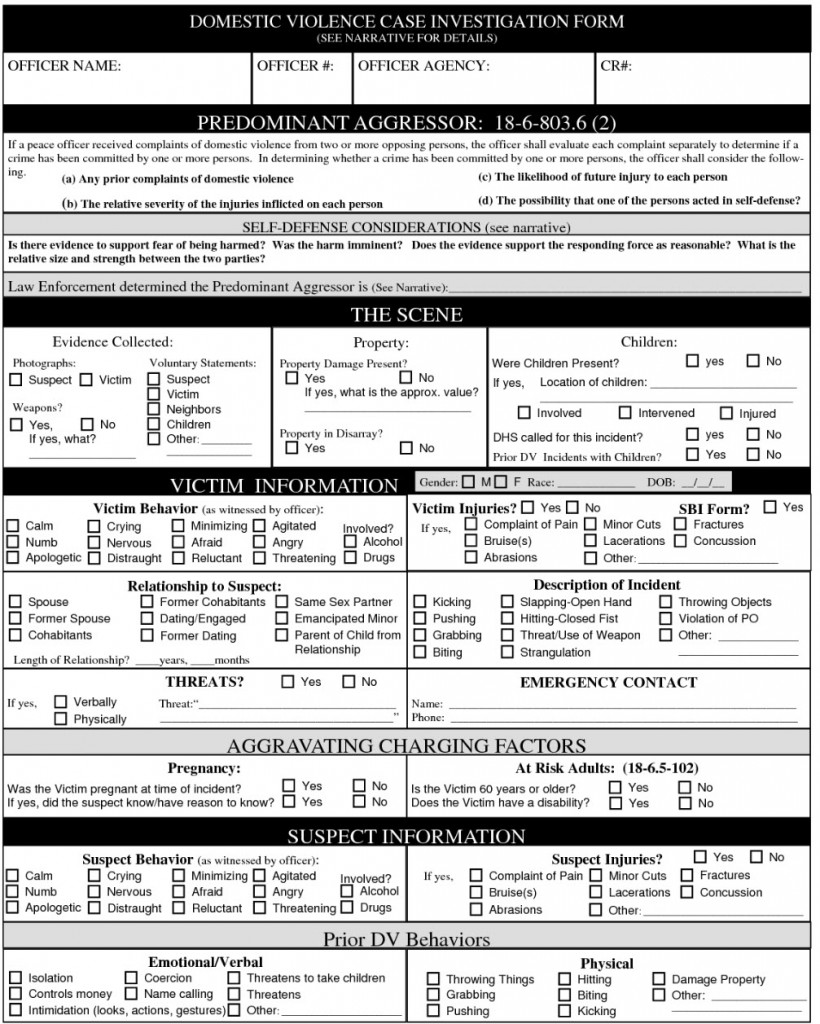




How DO The Police Evaluate Colorado Domestic Violence Cases? – The Law 18-6-803.6
By H. Michael Steinberg – Colorado Domestic Violence Criminal Defense Lawyer
How DO The Police Evaluate Colorado Domestic Violence Cases? – The Law 18-6-803.6 – Law Enforcement Officers in Colorado “get” domestic violence cases wrong so often that one wonders if they ever receive any serious training or have read the guidelines – such as they are – in the laws governing the arrest of those suspected of committing acts of domestic violence.
Two Parties Pointing At The Other – Two Accusers Of Domestic Violence – Who To Arrest – Primary Aggressor Analysis
Buried in a law – 18-6-803.6 – that most citizens (and police) have not read – are the guidelines that govern the arrest of those suspected of domestic violence. Where two parties to an act of domestic violence accuse the other – the analysis is called PREDOMINANT or PRIMARY AGGRESSOR ANALYSIS – 18-6-803.6 (2) – here is the law that applies:
[HMS – While the police do NOT have to make an arrest for domestic violence – they most often do and they often fail to properly analyze the situation. Under § 18-6-803.6: (1) An officer does not need to arrest both parties when responding to domestic violence reports – and, (2) An officer does not need to arrest anyone if there is no probable cause to believe a crime/offense was committed. ]
§ 18-6-803.6. Duties of peace officers and prosecuting agencies – preservation of evidence.
(1) When a peace officer determines that there is probable cause to believe that a crime or offense involving domestic violence, as defined in section 18-6-800.3 (1), has been committed, the officer shall, without undue delay, arrest the person suspected of its commission pursuant to the provisions in subsection (2) of this section, if applicable, and charge the person with the appropriate crime or offense.
Nothing in this subsection (1) shall be construed to require a peace officer to arrest both parties involved in an alleged act of domestic violence when both claim to have been victims of such domestic violence.
Additionally, nothing in this subsection (1) shall be construed to require a peace officer to arrest either party involved in an alleged act of domestic violence when a peace officer determines there is no probable cause to believe that a crime or offense of domestic violence has been committed.
The arrested person shall be removed from the scene of the arrest and shall be taken to the peace officer’s station for booking, whereupon the arrested person may be held or released in accordance with the adopted bonding schedules for the jurisdiction in which the arrest is made.
(2) If a peace officer receives complaints of domestic violence from two or more opposing persons, the officer shall evaluate each complaint separately to determine if a crime has been committed by one or more persons.
In determining whether a crime has been committed by one or more persons, the officer shall consider the following:
(a) Any prior complaints of domestic violence;
(b) The relative severity of the injuries inflicted on each person;
(c) The likelihood of future injury to each person; and
(d) The possibility that one of the persons acted in self-defense.
(3) (a) A peace officer is authorized to use every reasonable means to protect the alleged victim or the alleged victim’s children to prevent further violence. Such peace officer may transport, or obtain transportation for, the alleged victim to shelter. Upon the request of the protected person, the peace officer may also transport the minor child of the protected person, who is not an emancipated minor, to the same shelter if such shelter is willing to accept the child, whether or not there is a custody order or an order for the care and control of the child or an order allocating parental responsibilities with respect to the child and whether or not the other parent objects. A peace officer who transports a minor child over the objection of the other parent shall not be held liable for any damages that may result from interference with the custody, parental responsibilities, care, and control of or access to a minor child in complying with this subsection (3).
(b) For purposes of this subsection (3), “shelter” means a battered women’s shelter, a friend’s or family member’s home, or such other safe haven as may be designated by the protected person and which is within a reasonable distance from the location at which the peace officer found the victim.
(4) (a) The arresting agency shall make reasonable efforts to collect and preserve any pertinent evidence until the time of final disposition of the matter, including, but not limited to, the following:
(I) Any dispatch tape recording relating to the event;
(II) Any on-scene video or audio tape recordings;
(III) Any medical records of treatment of the alleged victim or the defendant; and
(IV) Any other relevant physical evidence or witness statements.
(b) However, in the absence of bad faith, any failure to collect or preserve any evidence listed in paragraph (a) of this subsection (4) shall not be grounds to dismiss the matter.
(4.5) When a peace officer responds to a call or is otherwise responding to a report about an alleged offense involving domestic violence, as defined in section 18-6-800.3 (1), or other domestic dispute, the officer shall include in his or her written or oral report concerning such incident whether children may have seen or heard the alleged offense; except that, in the absence of bad faith, the failure of a peace officer to note that a child may have seen or heard the alleged offense shall not be grounds to dismiss the matter.
(5) A peace officer shall not be held civilly or criminally liable for acting pursuant to this section if the peace officer acts in good faith and without malice.
Recent Studies Have Shown That Pressures To Arrest Have Been The Result Of These Laws
Colorado Domestic Violence Cases and Mandatory Arrest Laws: To What Extent Do They Influence Police Arrest Decisions?
There was a time when the police had the discretion in Colorado Domestic Violence cases that they have in almost every other area of criminal law. Colorado’s domestic violence laws are kind of hybrid as they give officers some discretion – but they also mandate arrests under certain circumstances.
Colorado Sees A Massive Increase In Domestic Violence Arrests
Research across the country also indicates that mandatory and preferred arrest domestic violence laws has resulted in an increase in arrests for intimate partner violence. .
Women are being arrested in larger and larger numbers especially in “dual arrest situations”– which situations occur when the police arrest both “sides” of a domestic violence case as having committed acts of domestic violence against each other.
The number of “dual arrest” scenarios have increased in recent years because of the difficulty on the part of the police to identify “the primary aggressor.” The truth is – the police often lack the proper training to identify or properly analyze on the scene the information necessary to properly identify the primary aggressor.
Politically Incorrect To Arrest Women As Initial Aggressors
It is apparent to anyone experienced in the Colorado Domestic Violence System that there exists both political and organizational pressure that actually can covertly discourage the police from arresting women as aggressors… therefore they will either arrest the man – OR they will arrest both parties..” the duel arrest” scenario
A study in 1999 performed in Boulder, Colorado found that male victims were three times more likely than female victims to be arrested along with the offender. Similarly – another study in Massachusetts also found that “male victims were five times more likely than female victims to be the subjects of a dual arrest.”
The police – mostly men – assume that adult male is situationally almost always the primary aggressor. The actual truth – supported by research is contrary to that assumption – “women do in fact commit a considerable number of violent acts in intimate relationships that do not constitute self defense.”
The mandatory arrest requirement in Colorado Domestic Domestic Violence cases has changed the manner in which the on the street police officer sees his or her job. Mandatory arrest laws lead the police to feel that there has been a shift – not only in their role – but in the :department’s” role in these cases.
These police officers will “follow the law” – make unjust and unfair arrests – and then let the D.A. “sort it all out later.”
A Commonly Used Tool To Assist Colorado Police In Analyzing Colorado Domestic Violence Investigations
In the interests of assisting the public in understanding the kinds of variables that should be taken into account in analyzing these cases – I include the following chart.. Good luck.
How DO The Police Evaluate Colorado Domestic Violence Cases? – The Law 18-6-803.6
If you found any information I have provided on this web page article helpful please click my Plus+1 button below so that others may also find it.
Never stop fighting – never stop believing in yourself and your right to due process of law.
ABOUT THE AUTHOR: H. Michael Steinberg – Email The Author at [email protected] – A Denver Colorado Criminal Defense Lawyer – or call his office at 303-627-7777 during business hours – or call his cell if you cannot wait and need his immediate assistance – 720-220-2277. Attorney H. Michael Steinberg is passionate about criminal defense. His extensive knowledge and experience of Colorado Criminal Law gives him the edge you need to properly handle your case.
A Disclaimer: While every effort has been made to ensure the accuracy of this publication, it is not intended to provide legal advice as individual situations will differ and should be discussed with an expert and/or lawyer. If you are seeking counsel there maybe other more specific technical or legal advice on the information provided and related topics. For that, please contact the author.
If you are charged with A Colorado crime or you have questions about the topic of this article – , please call our office. The Law Offices of H. Michael Steinberg, in Denver, Colorado, provide criminal defense clients with effective, efficient, intelligent and strong legal advocacy. We can educate you and help you navigate the stressful and complex legal process related to your criminal defense issue.
 H. Michael Steinberg, is a Denver, Colorado criminal defense lawyer with over 40 years of day to day courtroom experience – specializing in Colorado Criminal Law along the Front Range. He will provide you with a free initial case consultation to evaluate your legal issues and to answer your questions with an honest assessment of your options. Remember, it costs NOTHING to discuss your case. Call now for an immediate free phone consultation.
H. Michael Steinberg, is a Denver, Colorado criminal defense lawyer with over 40 years of day to day courtroom experience – specializing in Colorado Criminal Law along the Front Range. He will provide you with a free initial case consultation to evaluate your legal issues and to answer your questions with an honest assessment of your options. Remember, it costs NOTHING to discuss your case. Call now for an immediate free phone consultation.
Helping Clients To Make Informed Decisions In the Defense of Colorado Criminal Cases.
Contact A Lawyer with Three Decades of Experience as a Denver Criminal Attorney at The Steinberg Colorado Criminal Defense Law Firm today.
How DO The Police Evaluate Colorado Domestic Violence Cases? – The Law 18-6-803.6.

Other Articles of Interest:
- FAQ: Colorado Criminal – Domestic Violence Defense Law – What is Strangulation? What Does The Word Strangle Mean?
- How Mistakes Are Made In Colorado Domestic Violence Arrests – Predominant Aggressor Analysis
- Limits On Hearsay Evidence – Colorado Domestic Violence Cases – The Crawford Decision
- Dual Arrests – Colorado Domestic Violence Arrest Mistakes – The Predominant Aggressor Law – Revisited
- Colorado Domestic Violence Law – Arrests for Violations of Civil Protection – Restraining Orders














